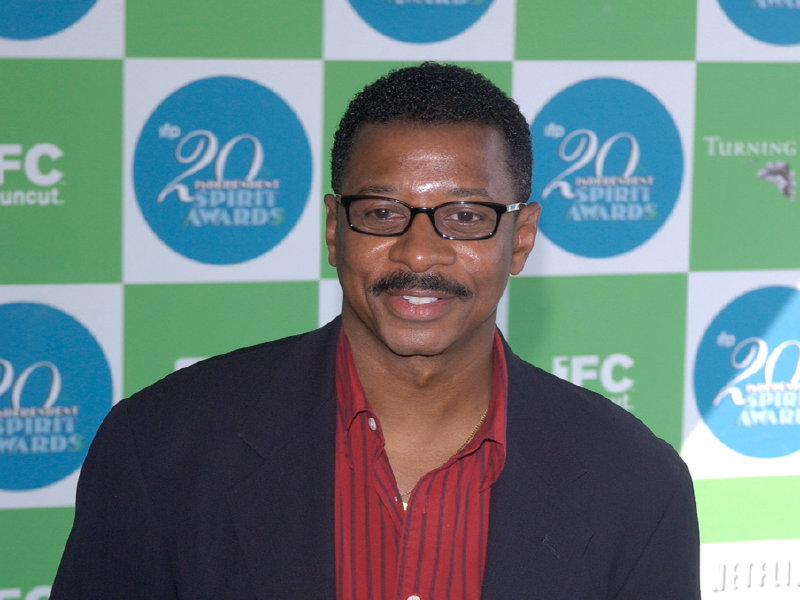It’s hard to imagine that, back in 1987, writer-director Robert Townsend thought that almost 30 years later, his showbiz satire "Hollywood Shuffle" would still be incredibly relevant. Townsend made the film as a response to his frustrations with the limited types of roles Hollywood had to offer actors of color. Certainly in several decades, the entertainment industry would have evolved, right?
Well, here we are.
While progress has been made, black audiences are still oddly considered a specialty or niche crowd, and when a film targeted at that audience succeeds (like last year’s "The Best Man Holiday," for instance), it’s still considered a surprise or a sleeper hit. The roles haven’t gotten much better either, a point film critic Wesley Morris made in his keynote lecture earlier during the Milwaukee Film Festival. Yes, Anthony Mackie can be in a superhero movie now; he just has to play sidekick.
So what better reason to head back to "Hollywood Shuffle," which returns to the big screen for a film festival showing on Friday, Oct. 3 at 7 p.m. at the Oriental (oh yeah, it’s also quite funny). Townsend himself will be in attendance on Friday, but before then, OnMilwaukee.com sat down with the writer-director to talk about his oh-so-timely film, his experiences as a black actor trying to make it and where we are now.
OnMilwaukee.com: When did the inspiration strike you to make "Hollywood Shuffle"? When did that become a project that you needed to make?
Robert Townsend: It really came out of my life at the time as an actor. I wrote the film with Keenen Ivory Wayans. We were both young actors, and "Hollywood Shuffle" was based on our experiences as young actors of color in Hollywood: all the bad auditions, all the stuff that comes with trying to make it in the industry, and having to deal with stereotypes and everything that comes with these auditions.
OMC: Obviously "Hollywood Shuffle" is satirical, but how much of what is on screen was stuff that you and Keenen experienced first hand in Hollywood?
RT: A lot of that stuff that’s in there, I’d say 80 percent is real – the auditions we went out for, the casting directors, the type of auditions we went for, even the stuff with the family. My grandmother in the film didn’t believe in me, and in real life, my grandmother didn’t believe in me. So we took stuff from real life situations and incorporated them into the film.
OMC: Were you able to eventually convince your grandmother that you could make it?
RT: Eventually, she became really one of my biggest fans. At first, I was like the only one in my family to go into show business, so my grandmother wanted me to get a job at the post office. Everybody’s kid got a good job at the post office, and they became supervisors, and that’s how they made a living. But I just saw something different. So all that stuff is really based on my life.
OMC: Now, without getting anybody in trouble or even naming names, what was the worst experience you had back in those days of trying to get a role and auditioning?
RT: I think the most degrading audition I ever had was there was an English director who was doing a black exploitation movie, and he was trying to tell me how to be black. And this is a guy was like (in a posh British accent), "It’s all wrong! When you get out of the Cadillac, jive walk! You walk like this!" It was the craziest audition of my life. I just remember going out of there thinking, like, this guy knows nothing about the hood, and he’s trying to tell me how to be black.
I think that’s where the Black Acting School came from, because there would be certain directors, producers and casting directors that would say, "This is how you say the line. This is how it is in the hood." Like really? When was the last time you were there? So all that stuff really added to the elements of the film.
OMC: Did you think while making "Hollywood Shuffle" that, decades later, it’d still be as relevant?
RT: You know what, I had no idea. We were just having fun, and we were doing something that made us laugh. Rather than get bitter by the roles we were going up for and the bad auditions, we decided to take that pain and turn it into comedy and laughter.
I grew up loving all the movie stars I saw. I never watched movies or television with a prejudiced eye. So I then looked at it and said, "OK, how do we make the best out of this situation?" And that’s when Keenen and I started to write and create "Hollywood Shuffle."
OMC: How do you feel where things are right now? Do you think there’s been much progress?
RT: There’s been some progress. It could be better, but I think for the most part … for example, I think about Shonda Rhimes, you have one of the most prolific showrunners in history that is a woman of color and doing incredibly well. You have Denzel now, who is an international movie star that can open number one at the box office. So I think there definitely has been a lot of progress.
OMC: How do you feel that the black voice in film can increase? How do you feel that a change can happen?
RT: I really think that now is a different time in history where technology makes it more affordable to make movies, to edit movies, to produce movies. So I think he or she that really has the talent and passion to make movies will rise to the top.
Because at the end of the day, with Hollywood, it’s not about the color of the skin; it’s about how much money a movie makes. It’s about greed. So whoever that filmmaker of color is, who figures out a compelling enough story and the quality is there, I think people always will respond to quality. And now, with Facebook and Twitter, your trailer can be seen by Hollywood people in a second, whereas before there was no entry level. You had to go to the studio, or you had to put it in the mail. Now, you can just send it.
So I think it’s a different time. More filmmakers are going to emerge; it’s all going to be about quality now, who’s got the quality.
As much as it is a gigantic cliché to say that one has always had a passion for film, Matt Mueller has always had a passion for film. Whether it was bringing in the latest movie reviews for his first grade show-and-tell or writing film reviews for the St. Norbert College Times as a high school student, Matt is way too obsessed with movies for his own good.
When he's not writing about the latest blockbuster or talking much too glowingly about "Piranha 3D," Matt can probably be found watching literally any sport (minus cricket) or working at - get this - a local movie theater. Or watching a movie. Yeah, he's probably watching a movie.







